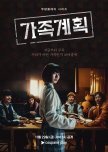
A Captivating Start That Leaves You Wanting More
This is a gem of a six-episode drama that delivers humor, heart, and an engaging story with no wasted moments. From the phenomenal transitions to the well-paced storytelling, the series ensures viewers are never confused, making it easy to dive into the narrative.The humor is a highlight—every joke lands perfectly, often leaving you in fits of laughter. Coupled with a stacked cast, nice family interactions, and a great soundtrack, the show keeps you entertained from start to finish.
As the final episode ends, you’re left craving more. This feels like just the beginning, and a second season or continuation is a must. This drama is a delightful appetizer that promises even greater things to come.
Esta resenha foi útil para você?

A Thrilling Surprise That Redefines the Genre
When I started A Shop for Killers, I had no idea what I was getting into. From the title alone, I imagined a run-of-the-mill battle royale scenario—maybe people trapped in a shopping mall, fighting for survival. But what I got was something far more innovative and gripping.The series masterfully combines its intense storyline with outstanding technical elements. The use of music is nothing short of incredible, amplifying every emotion and heightening the suspense at just the right moments. It’s clear that a lot of thought went into the sound design, and it pays off in spades.
The cinematography is another standout aspect. The creative camera shots add a layer of visual storytelling that keeps you hooked from episode to episode. While there’s a minor slip-up with the ropes in Episode 3—a noticeable rookie mistake—it’s easy to overlook given the overall quality of the production.
By the end of Season 1, I was completely hooked and eagerly anticipating Season 2. If it can match—or even surpass—the brilliance of the first season, we’re in for an unforgettable ride.
A Shop for Killers is a must-watch for anyone who loves a fresh, creative take on thrillers. It’s intense, stylish, and leaves you craving more.
Esta resenha foi útil para você?
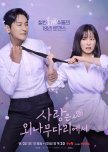
A Midlife Romcom That Feels Middle School
When you see the names "CJ ENM" and "Studio Dragon" flash across the screen in the opening credits, you know you’re in for a visual and technical treat. True to form, Love Your Enemy delivers on production quality, with polished cinematography and meticulous attention to detail. The music, too, is a standout, boasting contributions from some of the biggest names in the industry, making the OST a highlight of the drama.The series starts strong, peppered with laugh-out-loud moments that genuinely catch you off guard. The humor, especially in the early episodes, keeps the tone light and engaging. However, as the narrative unfolds, it becomes clear that Love Your Enemy is, at its core, a textbook romcom.
Unfortunately, the drama leans heavily on tired tropes. The depiction of characters—despite being in their 40s—sometimes feels juvenile, bordering on cringeworthy. The frequent reliance on the "adults acting like middle schoolers" cliché detracts from the emotional depth that one might expect from a series with mature protagonists.
Midway through, I found myself hoping for a pivot—a moment where the story would rise above its predictable beats and offer something refreshing or profound. Sadly, that moment never came. While it’s not a bad drama by any means, it fails to leave a lasting impression, playing it safe within the confines of its genre.
Love Your Enemy is an easy watch for those seeking light entertainment with high production values and catchy music. But for viewers craving depth or a fresh take on romance, it might feel like a missed opportunity.
Esta resenha foi útil para você?
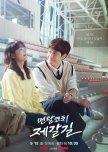
Esta resenha pode conter spoilers
An Underwhelming "Sports" Drama That Stretches Credibility More Than Bands
While marketed as a sports drama, this series surprisingly lacked any substantial depiction of sports across its 16 episodes, save for a few scenes of band stretching. The comedy felt dry and uninspired, failing to inject the light-hearted moments one might expect.The plot leaned heavily on a tired and overused trope in K-dramas—the omnipotent and corrupt assemblyman controlling everything from the shadows. This overplayed narrative device detracted from the story's originality and felt almost insulting in its predictability.
To its credit, the writing in the first six episodes was reasonably solid, showing potential that unfortunately wasn't sustained. However, the inclusion and persistence of a rapist and assailant "coach" character until the very end was baffling and deeply problematic. This narrative choice felt unnecessary and undermined the drama’s credibility, leaving a sour taste.
Although I avoided comparing this drama to Love All Play, doing so would inevitably result in a harsher critique. That said, the romance subplot was passable for most of the series, but the final episode completely derailed it, leaving an unsatisfying conclusion.
Despite my initial instincts to skip this drama for two years—instincts that now feel validated—I committed to watching it in its entirety. Under normal circumstances, I would have dropped it early on.
In summary, this drama's flaws—its lack of authentic sports representation, clichéd tropes, and questionable character choices—overshadowed its brief moments of decent writing. The key takeaway? Avoid comparisons to Love All Play to preserve what little goodwill remains.
Esta resenha foi útil para você?

A Whiff of Beer and Bubblegum
Sometimes a drama lands in the middle ground—not bad enough to rant about, not good enough to rave about. This particular romcom feels like white noise, a pleasant enough background hum that neither surprises nor offends. It’s just there.The story, ostensibly about beer (and maybe a covert PSA for liver transplant hospitals), checks every box for its genre. It’s bubbly, light, and packed with characters whose childlike antics make you feel like you’re watching a cartoon version of adulthood. While the premise is quirky, the execution doesn’t quite pop.
The second couple, though, steals the spotlight with their adorably sweet interactions. They’re a joy to watch and, honestly, more compelling than the main storyline at times. Thankfully, the drama avoids some of the genre’s most tired tropes—no love triangles, no catastrophic miscommunications, and (hallelujah!) no noble idiocy. Instead, we get two couples who actually talk to each other and work through their issues like emotionally intelligent adults. A rare win for healthy relationship portrayals in romcoms!
However, the narrative feels so light it’s almost forgettable. The pacing meanders, and there are plenty of moments where you might find yourself zoning out. The “special forces” subplot? Let’s just say it’s absurd enough to make you question its inclusion. And while the music is cute and inoffensive, it doesn’t leave much of an impression either.
If you’re looking for depth or a strong emotional arc, this isn’t the drama for you. But if you’re in the mood for something breezy and low-stakes—complete with a classic Kopiko ad cameo—it might scratch that itch.
Ultimately, this drama is like a glass of beer on a lazy afternoon. It’s light, frothy, and gone before you know it. Not every sip is memorable, but at least it doesn’t leave a bad taste.
Esta resenha foi útil para você?

Death's Game: Where Style Outplays Substance
"Death's Game" is a visually stunning K-drama that draws viewers in with its high production value and creative cinematography. The introduction is refreshingly concise, setting the stage without unnecessary exposition. The use of inventive camera angles, particularly the POV shots, adds a unique and engaging dimension to the viewing experience. These technical elements, combined with a parade of impressive guest appearances, make the show a feast for the eyes.While the production shines, the writing and storytelling fall into more conventional territory. The narrative is serviceable—neither groundbreaking nor particularly deep. It has its share of plot holes and moments that defy logic, but these flaws don’t detract too much from the overall experience. If anything, the show’s charm lies in its ability to keep things entertaining despite its narrative shortcomings.
The first part of the series stands out as stronger in terms of writing, setting a solid foundation before the second half loses some of its momentum. Even so, the show never stops being enjoyable. "Death's Game" leans heavily on its aesthetic appeal and star-studded cameos to keep audiences hooked, and it succeeds in that regard.
In the end, "Death's Game" isn’t a masterpiece of storytelling, but it’s undeniably fun to watch. If you’re looking for an eye-candy drama with creative visuals and an engaging cast, this one is worth a try. Just don’t expect it to redefine the genre.
Esta resenha foi útil para você?

Death's Game: Where Style Outplays Substance
"Death's Game" is a visually stunning K-drama that draws viewers in with its high production value and creative cinematography. The introduction is refreshingly concise, setting the stage without unnecessary exposition. The use of inventive camera angles, particularly the POV shots, adds a unique and engaging dimension to the viewing experience. These technical elements, combined with a parade of impressive guest appearances, make the show a feast for the eyes.While the production shines, the writing and storytelling fall into more conventional territory. The narrative is serviceable—neither groundbreaking nor particularly deep. It has its share of plot holes and moments that defy logic, but these flaws don’t detract too much from the overall experience. If anything, the show’s charm lies in its ability to keep things entertaining despite its narrative shortcomings.
The first part of the series stands out as stronger in terms of writing, setting a solid foundation before the second half loses some of its momentum. Even so, the show never stops being enjoyable. "Death's Game" leans heavily on its aesthetic appeal and star-studded cameos to keep audiences hooked, and it succeeds in that regard.
In the end, "Death's Game" isn’t a masterpiece of storytelling, but it’s undeniably fun to watch. If you’re looking for an eye-candy drama with creative visuals and an engaging cast, this one is worth a try. Just don’t expect it to redefine the genre.
Esta resenha foi útil para você?
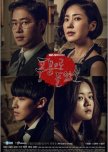
A Rollercoaster of Satire, Drama, and Frustration
Heard It Through the Grapevine is a drama that boldly kicks off with a strong, gripping premise, immediately immersing viewers in its sharp satire and intense family dynamics. However, while the opening episodes shine with energy and intrigue, the series gradually loses steam as it progresses, particularly in the middle stretch, where the narrative seems to meander. That said, the show manages to fill its hefty 30-episode runtime without feeling overly padded—a commendable feat in itself.One of the drama’s standout strengths is its masterful tonal balance. Few shows can oscillate between laugh-out-loud comedy and moments of heart-wrenching seriousness as seamlessly as this one does. This duality keeps the audience engaged, even when the plot occasionally falters. The ability to tackle heavy themes like family expectations, societal hypocrisy, and class divides while maintaining an undercurrent of humor is where this drama truly excels.
The production quality is impressive, especially for a 2015 series. Save for the occasional sound clipping during shouting scenes, the visuals, direction, and overall execution feel polished and modern. The music, while excellent, is sparse—more tracks would have enhanced the emotional depth of the longer runtime.
The characters are a mixed bag, with the male lead’s parents emerging as the ultimate villains—unbearably out of touch with reality and masters of deflection. Their treatment of Seo Bom, the drama’s central character in my eyes, is particularly frustrating. The absurdity of blaming her for everything, from adultery to workplace strikes to the proverbial end of the world, becomes a recurring theme that borders on exhausting. While this blame-game dynamic is likely intended to highlight the absurdity of their privilege and prejudice, it can feel repetitive and draining by the latter half of the series.
The subplot involving workplace politics is another weak point. It often feels disconnected from the more engaging family drama and personal conflicts. However, the side characters are handled well, with just enough screen time to add depth without overstaying their welcome.
Despite its flaws, Heard It Through the Grapevine delivers a satisfying emotional arc, with the final episode standing out as one of the series’ best. Alongside the stellar first episode, it bookends the story with poignant, memorable moments that linger long after the credits roll.
In conclusion, while the middle episodes sag under the weight of repetitive conflicts and misplaced blame, the drama’s sharp humor, emotional resonance, and strong start and finish make it worth the watch. It may test your patience at times, but its highs more than make up for its occasional lows. If you’re ready for a rollercoaster of laughter, frustration, and heartfelt moments, Heard It Through the Grapevine won’t disappoint.
Esta resenha foi útil para você?

Light, Love, and Shadows: The Unforgettable Journey of Definitely Not Today
Definitely Not Today is a refreshingly offbeat and captivating C-drama that defies conventional storytelling. From the very first episode, it exudes a cinematic charm reminiscent of Amélie. While it may not match the visual or directorial sophistication of that classic, it captures a similar whimsical yet poignant essence, creating an experience that feels more like watching a film than a traditional drama.The narrative starts light and quirky, with a playful energy underscored by a delightful soundtrack that perfectly complements its tone. But beneath its cheerful surface lies a deeply introspective story, tackling heavy and often uncomfortable themes. At its heart, the show is about a man grappling with despair and contemplating what one might call the "Osamu Dazai special." As the story unfolds, it takes a darker turn, delving into profound and unsettling territory while still maintaining a delicate balance with moments of levity.
One of the drama’s standout features is its approach to romance. Surprisingly, the chemistry between the leads feels more genuine and compelling than in many romance-focused dramas. Their connection is natural, understated, and deeply human, a testament to the stellar performances of the cast. The leads bring nuance and authenticity to their roles, making their journey together as impactful as the heavier themes the show explores.
What makes Definitely Not Today so gripping is its ability to pull you in completely. Initially intended as a casual watch during breaks, it became impossible to put down, compelling a binge-worthy experience. For cinephiles, the film references sprinkled throughout are an added treat, showcasing a love for cinema that resonates with viewers who appreciate the art form.
Despite its darker turns, the drama offers a satisfying and hopeful resolution, leaving viewers with a sense of closure and warmth. Definitely Not Today is a rare gem—a drama that dares to be unconventional, thought-provoking, and deeply moving, all while maintaining a unique charm. It’s a must-watch for anyone seeking something different, something that stays with you long after the credits roll.
Esta resenha foi útil para você?
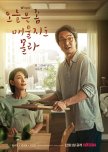
A Feast of Tears and Love
Watching Recipe for Farewell is like willingly stepping into an emotional storm, knowing full well it will leave you drenched in tears—and yet, you embrace it wholeheartedly. This drama isn’t just a show; it’s a soul-stirring journey that masterfully captures the full spectrum of human emotions. In its brief 30-minute episodes, it weaves a tapestry of grief, melancholy, gratitude, respect, love, and fleeting moments of joy, all with an authenticity that lingers long after the credits roll.From the very first episode, I was completely locked in. Not once did I glance away or feel the need to multitask. The story demanded my full attention, and I gave it willingly. For 12 episodes, I was stun-locked, utterly captivated by the beauty of its writing, the stellar performances of its cast, and the hauntingly perfect soundtrack. Each element worked in harmony to create an experience that was not just moving but transformative.
The final episode is a masterclass in poignancy. It doesn’t just end; it leaves you with a bittersweet ache, a reminder of the impermanence of life and the enduring power of love. It’s been a long time since a drama has moved me this deeply—Our Blues was the last one to evoke such raw emotion. But Recipe for Farewell feels uniquely special, a perfect blend of storytelling and artistry that resonates on a deeply human level.
This is more than a drama—it’s a reminder to cherish the connections we have and to find beauty even in the pain of letting go. Prepare yourself for tears, but also for a story that feeds the soul in the most profound way.
Esta resenha foi útil para você?

A Knockout Drama That Hits All the Right Notes
Every so often, a show comes along that completely blindsides you, and Boyhood is exactly that kind of drama. Before stumbling upon it, I had no idea it even existed, but now, I can confidently say it’s a hidden gem that deserves all the praise it can get.First and foremost, Boyhood showcases the extraordinary acting talent of Yim Siwan, who delivers a performance that is nothing short of breathtaking. His ability to embody his character with such depth and authenticity is awe-inspiring. And he’s not alone—the entire cast is phenomenal, each actor bringing their A-game to create a tapestry of unforgettable moments.
The director, whose work I wasn’t familiar with before this, deserves immense credit for the show’s stunning cinematography. Every scene feels meticulously crafted, with emotions brought vividly to life through the synergy of strong performances and masterful direction. Whether it’s comedy that genuinely makes you laugh, moments of frustration that hit hard, or heartbreak that leaves you gutted, Boyhood makes sure you feel every beat of its emotional spectrum.
One standout aspect is the fight scenes. They’re choreographed and filmed with such precision and artistry that they’re as much a visual treat as they are emotionally engaging. Adding to the experience is the show’s outstanding music, which elevates every scene to new heights. And let’s not forget the unexpected romance—it’s surprising how a non-romance drama manages to portray love better than many shows dedicated to the genre.
Another delightful touch is how each episode is named after legendary movies and TV shows. It’s a clever nod to pop culture that adds a layer of charm and personal connection for viewers like me, who couldn’t help but smile at the thoughtfulness behind it.
Boyhood has set the bar high, and I’m already seated and ready for season two. If the next installment is anything like the first, we’re in for another masterpiece. Bravo to everyone involved in this incredible drama!
Esta resenha foi útil para você?
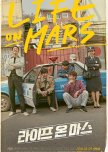
A Nostalgic Masterpiece with Thrills, Laughs, and Heart
Life on Mars is a masterful blend of mystery, nostalgia, and camaraderie, delivering a drama that is as thrilling as it is heartfelt. From the very beginning, the show captivates with a stellar opening that sets the tone for what promises to be an unforgettable ride.The production quality is nothing short of extraordinary. Shot in a cinematic 2.3:1 aspect ratio, the drama feels more like a carefully crafted film than a typical TV series. The color correction captures the essence of the 1980s, immersing viewers in its retro aesthetic, while the music selection perfectly complements the era. The creative use of POV shots had me audibly exclaiming in amazement—it’s a visual feast that keeps you glued to the screen.
Comedy is another strong suit of Life on Mars. The humor, often punctuated with nostalgic nods like the "Memories of Murder"-esque flying kicks, provides a delightful counterbalance to the show’s darker themes. The camaraderie between the characters, especially the team led by Jung Kyung Ho, is palpable and heartwarming. Jung Kyung Ho’s ability to forge believable friendships with his co-stars adds an emotional depth to the drama, making their chemistry feel natural and unforced.
The episodic cases are tightly written and resolved efficiently, avoiding unnecessary filler. The team’s synergy shines through in these moments, making each case feel engaging and meaningful. However, it’s around Episode 7 that the drama elevates itself even further, with the stakes rising and the soundtrack continuing to impress.
While I haven’t seen the original British series, I can confidently say that the Korean adaptation stands tall on its own merits and likely surpasses its source material. The cultural nuances, stunning production, and emotionally charged performances give it a distinct edge that makes it feel fresh and impactful.
That said, the show does stumble slightly in its later episodes. Between Episodes 12 and 14, the introduction of new characters and a reduction in screen time for the core cast disrupt the rhythm that had been so meticulously built. It feels as though the narrative takes an unexpected detour, momentarily diluting the momentum.
Fortunately, Life on Mars regains its footing in its final two episodes, delivering a jaw-dropping conclusion. The return of the original cast to the forefront brings back the magic that made the drama so compelling in the first place. The finale is nothing short of spectacular, tying up loose ends and leaving viewers with a sense of satisfaction.
In the end, Life on Mars is a brilliant drama that excels in its production, storytelling, and emotional resonance. While it experiences a slight dip in pacing, its strong start and unforgettable ending make it a must-watch for fans of crime dramas and nostalgic storytelling alike. Truly, a beautiful conclusion to an amazing journey.
Esta resenha foi útil para você?






